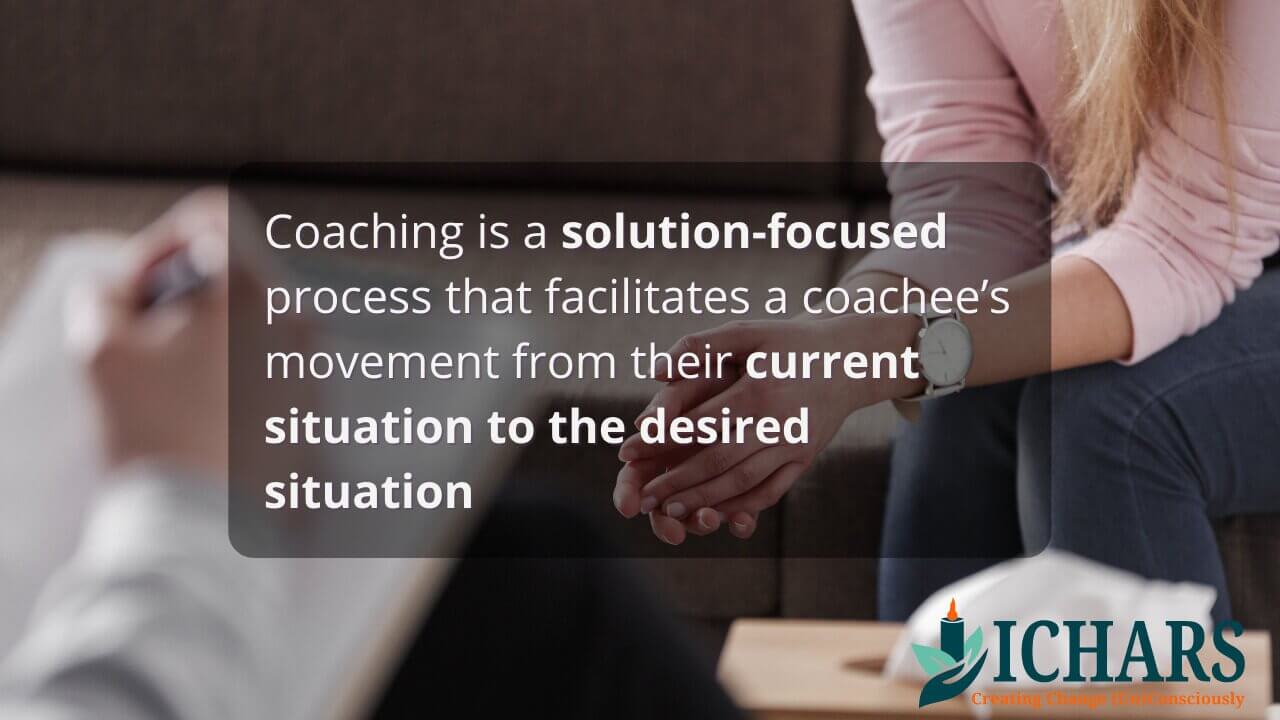Coaching is a powerful process that empowers individuals to bridge the gap between where they are and where they want to be. In this comprehensive guide, we will delve into the world of coaching, exploring what is coaching, the various coaching competencies, coaching models, and differentiating coaching from other related fields.
What is coaching all about?

As discussed during the interview on Life Coaching with Misba Shah:
Coaching is a Solution-Focused process that facilitates the movement of individuals from their current situations to their desired outcomes.
The four basic components of any coaching process / coaching model includes:
- Outcome or Goal
- Current reality or situation
- Systematic plan of action and
- Action
Almost all coaching models include these components. Though different models will build up on these components and will have their own ways of exploring each of these components.
What is a Coaching Model?
A coaching model is a framework; it’s the underlying structure that you can use when you’re coaching someone. This structure consists of different components or steps.
Each component or step has an objective that allows you to ensure that the coaching session is systematic and does not spiral into a roundabout chat.
There are multiple coaching models but all of them are based on the primary understanding of what coaching is about. Some of the popular Coaching Models include:
GROW is widely regarded as the cornerstone upon which many other coaching models are built. For an in-depth understanding of this model, “Coaching for Performance” by Sir John Whitmore is a recommended read.
Additionally, you can find comprehensive step-by-step guides for each of these models on the ICHARS blogs.
Which is the most powerful coaching model?
SOFT SEA is in our opinion the most powerful and comprehensive coaching model.
Here’s why:
- Comprehensive Approach: It covers a wide range of coaching scenarios, making it applicable to various fields.
- Integration: It seamlessly integrates with other change processes, such as hypnosis and NLP.
- Systematic Planning: It provides a structured framework for goal setting and action planning.
- Client-Centric: It focuses on the client’s unique needs and objectives.
- Proven Success: It has demonstrated effectiveness in personal development, career coaching, and therapeutic coaching.
In summary, the SOFT SEA model’s flexibility and effectiveness make it a powerful choice for coaches across different disciplines. Numerous case studies demonstrate how this model has enabled coaches to facilitate life-transforming changes for their clients.
That said, it is important to remember that these models are just that models. The effectiveness of these model to a large extent depends on the coaching competencies that the coach may or may not have.
In short having these coaching competencies will ensure that the coach will be able to bring out the best from their coachees.
What are the different Coaching Competencies?
Any discussion on what is coaching is incomplete without understanding the role of coaching competencies.
Coaching competencies can be defined as the knowledge, skills, abilities, and attitudes a coach must possess to provide effective coaching. They are the minimum standards that every coach must meet to be considered competent.
These Coaching Competencies include:
- Setting the foundation:
- Establishing the coaching agreement
- Meeting Ethical Guidelines and Professional Standards
- Co-creating the relationship:
- Using a flexible approach that is client-centric
- Managing self and maintaining coaching presence
- Establishing a trust-based relationship with the coachee
- Communicating Effectively
- Engaged Listening
- Powerful Questioning
- Flexible/Person centric communication
- Facilitating Learning and Results
- Raising awareness and insights
- Inviting Possibility
- Ecological goal setting:
- Designing Actions:
- Overcoming conscious and unconscious hindrances:
- Managing Progress and Accountability:
You can get more details about each of these coaching competencies by checking out the post titled “Coaching Competencies that every coach must have but most don’t.“
What is the difference between Coaching and Therapy?
Primarily Coaching is all about working with present and future. It is more outcome-focused with emphasis on identifying and applying the plan of action to achieve the desired outcome.
Though Coaches are trained to help clients focus on the present and work towards the desired future, they are not really equipped to help clients deal with intense negative emotions or issues coming from the past.
Therapists, on the other hand, are expected to focus more on past and negative emotions as opposed to any specific goal that the client may wish to achieve. Classically, therapy would also include developing a deeper understanding of the cause of the problem and may majorly revolve around resolving emotional baggage coming from the past. Work with any kind of disorder or addiction will also fall within the realm of therapy.
Having said that, this distinction between coaching and therapy is more applicable to coaches than to therapists. Most successful therapists, if not all, knowingly or unknowingly do help the clients move towards their goals.
As we see it, coaching is a subset of therapy. All therapists who use a solution-focused approach, coach their clients but coaches can’t take therapies for clients unless they are trained therapists as well.
For further insights into this topic, “The Skilled Helper” by Gerard Egan delves into the distinctions and boundaries between coaching and therapy.
Table showing the Differences between Coaching and Therapy
| Coaching | Therapy |
| Views the client as creative, resourceful and whole. | Views clients from a diagnosis and treatment perspective. |
| Emphasis on present and future. | Emphasis on past and present. |
| Action and being oriented. | Insight oriented. |
| Solution oriented. | Problem oriented. |
| Helps clients design their lives. | Resolves issues. |
| Coaches and clients on a peer basis. | Hierarchical difference between therapist and clients |
| Active, energetic approach. | Passive, reflective, background approach. |
| Focus on exploring and achieving the client’s potential. | Focus on healing and understanding the client. |
| Emphasis on present and future. | Emphasis on past and present. |
| Explores actions and behaviours to achieve goals. | Increases client insight. |
| Regard and coach negative self-beliefs as temporary obstacles | Analyse and treat origins and historical roots of negative self-beliefs. |
| Coach and client ask: “What’s next/what now?” | Therapist and client ask: “Why and from where?” |
| Takes the client form where they are and helps them move forward. | Examines unfinished emotional business from all stages of life. |
| Uses coaching skills. | Uses therapy techniques. |
Which is the best Coaching Certification Program?
Selecting the right coaching certification program is a critical step in your journey towards becoming a successful coach. The “Cognitive Hypnotic Coaching® Diploma Program” consistently stands out for several compelling reasons:
- Comprehensive Curriculum: This program offers an extensive curriculum, encompassing a wide range of coaching competencies, techniques, and tools. It equips you with a diverse skill set, enabling you to effectively address various client needs.
- Integration of Hypnosis: What sets this program apart is its seamless integration of hypnosis into coaching. Hypnosis techniques complement coaching, helping clients overcome limiting beliefs, fears, and barriers more effectively.
- Experienced Instructors: Typically led by experienced and renowned instructors in psychology, coaching, and hypnosis, learning from experts enhances the depth and quality of your training.
- Real-World Application: Emphasizing practical application, the program provides hands-on experience through case studies, role-playing, and real coaching sessions. This prepares you for the complexities of real-world coaching.
- Flexibility: The program strikes a balance between structure and adaptability, ensuring you’re never left wondering what to do next while tailoring approaches to individual client needs.
- Supportive Community: Building connections with fellow students and alumni is invaluable. This program often fosters a supportive community where you can network, share experiences, and learn from others.
- Results-Driven Approach: Focused on helping clients achieve tangible results, the program aligns with coaching’s outcome-oriented nature. This emphasis on practical outcomes sets you apart as a coach who delivers meaningful change.
Ultimately, the best coaching certification program for you hinges on your specific goals, preferences, and learning style. However, the “Cognitive Hypnotic Coaching™ Certification Course” consistently receives high praise due to its comprehensive approach, practical orientation, and integration of valuable techniques like hypnosis. Reviews and testimonials from program graduates underscore its effectiveness. If you aspire to excel in the coaching field, this program is well worth considering.

